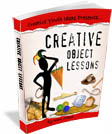Description
Youth Bible study activity using wind-up toys. Works great as a discussion about free will or for discussing running in the Christian race. It could also be tied into Disney’s “Toy Story 3” in which Andy is all grown up now and ready to leave home for college. For the toys, the prospect of having no one who will Love them and spend time with them takes them down a path of despair and filled with dangers. Andy has to learn to put away childish things and the toys find purpose in bringing joy to another young person, filled with life, energy, love and childish delight. Sometime we also feel that God has set us aside and gone on to other things. But he hasn’t forgotten us. He will always be there for us. And like the toys, we may find our energy exhausted, and ourselves in less than pristine condition, but we find great joy in life when we are fulfilling the purpose for which we were created.
Resources Needed
Get a variety of kinds wind-up toys. These are often readily available at fast food chains as part of the kid’s meals. They can also be found in most toy stores. Some of the toys might be as cars, small figurines / action figures, cymbal clanking monkeys, or fanciful spinning tops etc. They come in a variety of forms and sizes. If you can get enough of the wind-up toys for everyone then it is a nice reminder of the lesson for the youth to take back home. Otherwise you can have one wind-up toy for every pair, trio, or small group of youth depending on the size of the youth group.
What to Do
- Stage a variety of toy relay races. Set a goal, let everyone wind up their toys, and let them go. You might want to have several heats to make the activity last longer. Race the wind-up toys a few at a time and then have winners of those races compete against each other until you have a final race between the top wind-up toys. To add a little variety, you can add some obstacles, traps like a strip of sticky tape, rubber balls, etc.
- Treat it like real race: On your mark, get set, go and a loud cap-gun. Gentleman start your engines, etc. Have prices for the winners as well as a victory celebration. You can also award additional prizes to various wind-up toys in addition to the winners:
- Most helpless
- Most lost
- Most persistent
- Strongest
- Funniest finish
- Best “crash and Burn”
- Slowest
- Fastest
- Most direct route to the finish
Discussion
What are some of the things you observed in the races of the wind-up toys?
Possible answers will likely include some of the following points:
- They need to be wound up
- They sometimes change direction unexpectedly
- Even when they run into walls, the keep going without any change of direction.
- Eventually the wind down.
- They perform different actions when wound up.
- They were designed and created to do different things.
- They only do what they were created to do
- They can be easily broken.
- They sometimes fall over for no apparent reason.
- They don’t always stick to the intended path.
- Not all finish the race.
- Some veer off course.
In what ways are our lives similar / different from those of wind up toys?
Take it to the Next Level
In a way God creates us, sets us on a path, and then lets us go. In time we run down, but the question is what we will do in the time we are given? but unlike the wind-up toys, we can choose our path. and while each of us is created with a purpose, we can choose to deviate from the chosen path and to act contrary to the purpose for which we were created. But like the wind-up toys there are some people who live wind-up mechanical lives without meaning and purpose.
You can also explain the different types of toys found today. Wind up toys used to be very common. Most toys today use batteries. What is the purpose of the wind up mechanism or the battery? The main purpose is to store energy for later use. There are many methods toy makers use to transfer and store energy. A yo-yo or a top uses a piece of string wrapped around an axel. Some toys use small springs that are tightened. Many clocks and musical jewelry boxes work on this same principle. A rubber band wrapped around an axle can also store energy. You might want to disassemble several toys and show students the springs or rubber bands inside that are “squeezed,” “stretched,” or “twisted” to give the toy energy. Ask the students to predict what mechanism is used inside the toy to store and release energy.
Discussion
- Where do you get your energy?
- What things give you a push, give you a stretch, or twists your life around causing things to happen?
- What gets you wound up? What energizes you?
- What wears you down? What drains your energy?
- If you had to describe your life as that of a toy, what would it be? Why?
- What characteristics do the toy and you have in common? In what ways are you different?
Take it to the Next Level
As Christians, we attempt to live each day for the purpose that God created us, glorifying His name, attempting to do as He would do, and following His will and following His guidance. Like the toys there will be times when we run down, when we stray, and when we find ourselves banging against a wall or barrier. But God didn’t just create us and and let us go on our own. He doesn’t look upon us as some sort of wind-up toy that He might set on the ground and then watch as it aimlessly runs into obstacle’s, never heading in the direction in which He pointed it, or falling over…legs still churning in mid air now – going nowhere. Instead God is constantly watching over us, waiting to energize us, and picking us up and pointing us back to the correct path.
Sometimes the obstacle’s we face are being used to nudge us back on to the right path…like a guardrail. And at times we stubbornly fight the change in our direction until our energy is exhausted. But God does care. He’s simply waiting for you to quit struggling and to call out to Him so that he can re-energize you and set you back on course in the right direction.
Variation
Play a game in which the youth take on the role of wind-up toys in a game of Simon says.
- Blindfold the youth (optional)
- Have the youth spin around and point in various directions.
- Then in the style of Simon Says have them follow the directions you give them to move forward a certain number of steps, turn right, hop, jump, etc
Discussion
- How was this game similar to the way people live their lives?
- What did you do when you encountered obstacles?
- How do you know when you’ve hit a wall in life and need to change direction?
- In what ways does God guide us?
- In what ways does God empower us for the journey ahead?
- What can we do when we run down and are exhausted?
Scripture references
Philippians 3:13-14, Psalm 138:8, Proverbs 16:4, Romans 11:36, Matthew 7:13-14, Proverbs 19:21, Philippians 4:13, Deuteronomy 28, Romans 8:12-13, Ephesians 5:18-21


MORE IDEAS? See “Creative Object Lessons”
200 page e-book that explains everything you need to know when planning your very own object lessons. It contains 90 fully developed object lesson ideas and another 200 object lesson starter ideas based on Biblical idioms and Names / Descriptions of God.
Learn More…


Go for the Gold
Need an evangelistic Youth Camp/ Bible Study Series with an Olympic Theme?
What is salvation all about? What does it mean to be saved? This sports themed Bible Study / Camp Curriculum uses the Olympic Flag to introduce the concepts of sin (black circle), forgiveness (red circle), purity (white background), spiritual growth (green circle), heaven (Yellow Circle) and (Baptism) blue circle.
-> Tell me about “Go for the Gold”


Destined to Win
Need a Youth Camp/ Bible Study Series on “Running the Christian Race”?
The race as a metaphor for the Christian life is used in several places in the Bible. This series is a great follow up for new Christians or to re-emphasize the basics of our spiritual Journey in the Faith. This Bible Study / Camp Curriculum has a sports theme and is great for athletes as well as a tie in to the youth Olympic Games.
->Tell me about “Destined to Win”

 MORE IDEAS? See “Creative Object Lessons”
MORE IDEAS? See “Creative Object Lessons”




